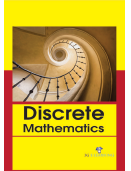Mathematics

Discrete mathematics is the branch of mathematics dealing with objects that can assume only distinct, separated values. The term "discrete mathematics" is therefore used in contrast with "continuous mathematics," which is the branch of mathematics dealing with objects that can vary smoothly (and which includes, for example, calculus). Whereas discrete objects can often be characterized by integers, continuous objects require real numbers. The study of how discrete objects combine with one another and the probabilities of various outcomes is known as combinatorics. Other elds of mathematics that are considered to be part of discrete mathematics include graph theory and the theory of computation. Topics in number theory such as congruences and recurrence relations are also considered part of discrete mathematics. The study of topics in discrete
mathematics usually includes the study of algorithms, their implementations, and e ciencies. Discrete mathematics is the mathematical language of computer science, and as such, its importance has increased dramatically in recent decades. It is progressively being applied in the practical elds of mathematics and computer science. It is a very good tool for improving reasoning and problem-solving capabilities.